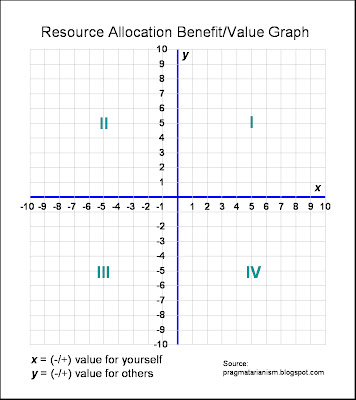- Joined
- Sep 16, 2010
- Messages
- 2,071
- Reaction score
- 163
- Gender
- Male
- Political Leaning
- Other
Check out this graph that I created...

I wonder how many of you suffer from math PTSD. Let me know if you felt any anxiety when you saw this chart.
Ok, so here's the logic. At any given time you have a finite amount of resources at your disposal. Just having these resources though isn't as important as how you use them. Each particular use (allocation) of your resources will provide you with x amount of value and others with y amount value. Given that that no two allocations of your resources will create/destroy the same exact amount of value, every single possible allocation of your resources can be plotted on a different point on this graph.
Where would you plot the following?
Forgetting to wear deodorant
Helping your friend move
Realizing after it's too late that there isn't any toilet paper
Donating $100 to your favorite cause
Pranking your friend
Going to a party instead of studying for an exam
Having sex with your best friend's significant other
Curing cancer
Losing $1000 at the race track
Starting WWIII
When you compare any two points on the graph, whichever point is closest to (10,10) is the more efficient (less wasteful) allocation. A mistake is when the less efficient allocation is chosen. The size of the mistake can be determined by subtracting the shorter distance from the longer distance.
We're all fallible, but we're not all equally fallible. It's a given that some people are going to make less mistakes than other people. Markets work because people can give you positive feedback (money) if your resource allocations create value for them. As a result, the more value that you create for others, the more influence you'll have over how society's limited resources are used. This fail safe device limits the amount of resources that end up in the hands of the people who make the most mistakes.
If we can't give people feedback on how well they are using society's limited resources, then too many resources will end up in the wrong hands. Even when resources do happen to end up in the right hands...producers will be decentivized because the size of the carrot will not depend on their effort to research and accurately predict the most valuable allocations.
If anybody is interested in a critique of dollar voting please read On the Phenomenon of Bull**** Jobs by David Graeber. For a short and sweet rebuttal please read BS Jobs and BS Economics by Alex Tabarrok. For a longer, but relatively accessible, rebuttal I highly recommend reading Democracy, the Market, and the Logic of Social Choice by Samuel DeCanio.
I wonder how many of you suffer from math PTSD. Let me know if you felt any anxiety when you saw this chart.
Ok, so here's the logic. At any given time you have a finite amount of resources at your disposal. Just having these resources though isn't as important as how you use them. Each particular use (allocation) of your resources will provide you with x amount of value and others with y amount value. Given that that no two allocations of your resources will create/destroy the same exact amount of value, every single possible allocation of your resources can be plotted on a different point on this graph.
Where would you plot the following?
Forgetting to wear deodorant
Helping your friend move
Realizing after it's too late that there isn't any toilet paper
Donating $100 to your favorite cause
Pranking your friend
Going to a party instead of studying for an exam
Having sex with your best friend's significant other
Curing cancer
Losing $1000 at the race track
Starting WWIII
When you compare any two points on the graph, whichever point is closest to (10,10) is the more efficient (less wasteful) allocation. A mistake is when the less efficient allocation is chosen. The size of the mistake can be determined by subtracting the shorter distance from the longer distance.
We're all fallible, but we're not all equally fallible. It's a given that some people are going to make less mistakes than other people. Markets work because people can give you positive feedback (money) if your resource allocations create value for them. As a result, the more value that you create for others, the more influence you'll have over how society's limited resources are used. This fail safe device limits the amount of resources that end up in the hands of the people who make the most mistakes.
If we can't give people feedback on how well they are using society's limited resources, then too many resources will end up in the wrong hands. Even when resources do happen to end up in the right hands...producers will be decentivized because the size of the carrot will not depend on their effort to research and accurately predict the most valuable allocations.
If anybody is interested in a critique of dollar voting please read On the Phenomenon of Bull**** Jobs by David Graeber. For a short and sweet rebuttal please read BS Jobs and BS Economics by Alex Tabarrok. For a longer, but relatively accessible, rebuttal I highly recommend reading Democracy, the Market, and the Logic of Social Choice by Samuel DeCanio.
